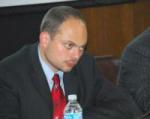
Last week’s Group of Seven summit in Charlevoix, Canada, was not the most cordial of gatherings, especially for a group whose members are supposed to be bound by shared values. One of the most heated discussions revolved around the membership criteria for what was long known as the group of leading industrial democracies. At least two G-7 leaders have called for the restoration of Russia’s participation, prompting the host, Canadian Prime Minister Justin Trudeau, to respond that this, for now, is not “even remotely” possible. A senior European diplomat tactfully noted the need “to remember why G-8 became the G-7” in the first place: because of Vladimir Putin’s unlawful annexation of a part of another European country’s territory.
The mood was once different at G-7 summits. The year was 1997. Russia recorded its first year-on-year economic growth since the fall of the Soviet Union. Its most popular politician was a reformist deputy prime minister by the name of Boris Nemtsov. And it seemed firmly on track in its democratic transition, with a pluralistic (if sometimes unruly) parliament, competitive elections, and vibrant media.
That was when the G-7 officially became the G-8. In the final communique adopted at their June meeting in Denver, G-7 leaders affirmed that “Russia has taken bold measures to complete an historic transformation into a democratic state with a market economy” and called for “a fuller involvement of Russia in the Summit process.” The following year, in 1998, Britain hosted the first G-8 summit, with President Boris Yeltsin of Russia attending as a full participant. “In two days … he taught his fellow participants not to stumble when pronouncing ‘G-8’ instead of ‘G-7,’ ” the Russian press commented on that meeting.
Advertisement / Reklaam
Advertisement / Reklaam
The stumbling began later, when Yeltsin’s unlikely successor in the Kremlin moved at a breathtaking pace to dismantle key elements of “the historic transformation” hailed by the Russia’s G-8 partners. By the end of 2003, a reverse transformation had been completed. Putin’s government cut off private television networks, ejected meaningful opposition from parliament in an election assessed as “not fair” and threw Russia’s richest man in prison for backing that opposition in a clear warning to the business community to stay out of politics. (Disclosure: that man was Mikhail Khodorkovsky, who is the founder of the Open Russia movement, of which I am currently vice chairman.) Russia could no longer seriously claim to be an “industrial democracy.”That same year, a bipartisan group of U.S. senators introduced a resolution calling for the suspension of Russia’s participation in the G-8 until the restoration of democracy. “President Putin’s assault on democracy in Russia violates the spirit of the Group of Eight,” said then-Sen. Joseph I. Lieberman (D-Conn.), a co-sponsor of the legislation. “To allow Russia to remain a member as it continues to suppress political opposition parties and silence free and independent media would make a mockery of the democratic principles that bind the G-8 together,” he said. Sen. John McCain (R-Ariz.), the resolution’s main sponsor, held that “it is time to send a signal to President Putin’s government that undemocratic behavior will exclude Russia from the company of Western democracies.”
No such signal was sent, however. Western leaders — including U.S. presidents of both parties — continued to roll out red carpets for Putin (or his short-term placeholder, Dmitry Medvedev) at summit after summit. Boris Nemtsov, by now the leader of Russia’s opposition, once quipped that the G-8 should more appropriately be known as “G-7 plus Putin.”
It took the first territorial annexation in Europe since the end of the World War II for the rest of the G-8 leaders to acknowledge the obvious: that the head of an authoritarian regime has no place at the table of democratic leaders. The announcement came as preparations for the 40th G-8 summit in Sochi were already underway. I remember a passport control booth set aside for delegations arriving to the “Sochi G8 Summit” at Moscow’s Sheremetyevo airport in the early months of 2014. If that sign was preserved, it must now be a collector’s dream. The summit never took place. Instead, G-7 leaders met in Brussels without Russia for the first time in nearly two decades.
Advertisement / Reklaam
Advertisement / Reklaam
Supporters of Putin like to say that, whatever our country’s domestic problems with corruption, economic inequality and the lack of political freedom, he at least restored Russia’s standing in world affairs. Such assertions sound like a mockery. It was in the difficult and tumultuous 1990s that Russia became a full member of the G-8, the Council of Europe and the World Bank, to name just some of the pillars of the modern international order. It was the policies of Putin and his regime that reduced a proud nation to near-rogue status in global affairs.In the summer of 2008, Yelena Bonner, the widow of the Nobel Prize-winning Soviet physicist and dissident Andrei Sakharov, wrote to U.S. presidential candidates urging them to “stop honoring Russian tyrants as duly elected democratic leaders” and disinvite Putin from G-8 meetings. Ever an optimist, she added that “there will come a time when Russia becomes a democracy and takes her rightful place among the free nations.” Russia is a major world power that deserves a full seat at the G-8 table — but not until the day that Putin’s authoritarian kleptocracy is replaced by a democratic government that respects the rule of law both at home and abroad.
























